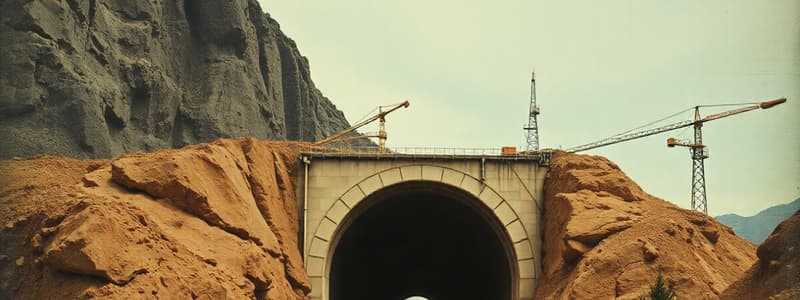Podcast
Questions and Answers
What is the primary purpose of rock mechanics in tunnel engineering?
What is the primary purpose of rock mechanics in tunnel engineering?
- To study rock mass behavior under stress (correct)
- To measure drill core quality
- To evaluate joint spacing
- To assess groundwater impact on excavation
Which factor is NOT part of the Q-System formula used for rock quality assessment?
Which factor is NOT part of the Q-System formula used for rock quality assessment?
- Groundwater impact factor (G) (correct)
- Joint water reduction factor (Jw)
- Stress Reduction Factor (SRF)
- Rock Quality Designation (RQD)
What does the term 'joint spacing' refer to in tunnel engineering?
What does the term 'joint spacing' refer to in tunnel engineering?
- The width of the joints in rock
- The distance between fractures in the rock (correct)
- The angle at which fractures occur
- The length of the fractures in the rock
What is the main advantage of using Fiber-Reinforced Shotcrete (FRS) over standard shotcrete?
What is the main advantage of using Fiber-Reinforced Shotcrete (FRS) over standard shotcrete?
In the context of tunnel support systems, what is a primary function of rock bolts?
In the context of tunnel support systems, what is a primary function of rock bolts?
Which support system is typically used for immediate stabilization of tunnel walls?
Which support system is typically used for immediate stabilization of tunnel walls?
What does an Excavation Support Ratio (ESR) indicate about a tunnel project?
What does an Excavation Support Ratio (ESR) indicate about a tunnel project?
Which of the following factors is NOT influenced by groundwater in tunnel engineering?
Which of the following factors is NOT influenced by groundwater in tunnel engineering?
What is the significance of measuring intact rock strength in tunnel engineering?
What is the significance of measuring intact rock strength in tunnel engineering?
What common failure mechanism occurs when shotcrete separates from the rock?
What common failure mechanism occurs when shotcrete separates from the rock?
What is the role of 'Joint Orientation' in tunnel engineering?
What is the role of 'Joint Orientation' in tunnel engineering?
How does the Excavation Support Ratio (ESR) influence tunnel design?
How does the Excavation Support Ratio (ESR) influence tunnel design?
What does a low Q value indicate regarding rock mass quality?
What does a low Q value indicate regarding rock mass quality?
What is the primary function of Cable Bolts in tunnel support systems?
What is the primary function of Cable Bolts in tunnel support systems?
Which factor does NOT influence the effectiveness of Joint Water Reduction in the Q-System?
Which factor does NOT influence the effectiveness of Joint Water Reduction in the Q-System?
What characterizes Fiber-Reinforced Shotcrete over standard shotcrete?
What characterizes Fiber-Reinforced Shotcrete over standard shotcrete?
What does the formula for the Q-System aim to evaluate?
What does the formula for the Q-System aim to evaluate?
What is the main purpose of measuring Joint Persistence in rock mechanics?
What is the main purpose of measuring Joint Persistence in rock mechanics?
What is the significance of the Rock Quality Designation (RQD) in rock mass classification?
What is the significance of the Rock Quality Designation (RQD) in rock mass classification?
What type of failure does shear failure refer to in the context of shotcrete?
What type of failure does shear failure refer to in the context of shotcrete?
Which factor primarily affects the stability and excavation process of a tunnel?
Which factor primarily affects the stability and excavation process of a tunnel?
What does the variable 'Jn' in the Q-System formula represent?
What does the variable 'Jn' in the Q-System formula represent?
Which method is used for immediate stabilization of tunnel walls?
Which method is used for immediate stabilization of tunnel walls?
What does a higher Excavation Support Ratio (ESR) generally imply for tunnel stability?
What does a higher Excavation Support Ratio (ESR) generally imply for tunnel stability?
Which characteristic of a joint is quantified by the term 'joint aperture'?
Which characteristic of a joint is quantified by the term 'joint aperture'?
What is the outcome of a poor quality rock mass, indicated by a low Q value?
What is the outcome of a poor quality rock mass, indicated by a low Q value?
Which of these materials is reinforced with fibers to improve its properties?
Which of these materials is reinforced with fibers to improve its properties?
What does the Q value depend on regarding joint characteristics?
What does the Q value depend on regarding joint characteristics?
What is the main purpose of the Rock Quality Designation (RQD) measure?
What is the main purpose of the Rock Quality Designation (RQD) measure?
Which failure type is characterized by the layer sliding under pressure in shotcrete?
Which failure type is characterized by the layer sliding under pressure in shotcrete?
What does the variable 'Ja' represent in the Q-System formula?
What does the variable 'Ja' represent in the Q-System formula?
Which material is typically used to distribute forces during tunnel support?
Which material is typically used to distribute forces during tunnel support?
In the context of tunnel engineering, what does a low Excavation Support Ratio (ESR) suggest?
In the context of tunnel engineering, what does a low Excavation Support Ratio (ESR) suggest?
What does 'RQD' stand for in rock mass classification?
What does 'RQD' stand for in rock mass classification?
Which aspect of rock behavior is assessed by studying joint persistence?
Which aspect of rock behavior is assessed by studying joint persistence?
What factor influences the stability of shotcrete in tunnel construction?
What factor influences the stability of shotcrete in tunnel construction?
Which support system is specifically designed for deeper tunnel applications?
Which support system is specifically designed for deeper tunnel applications?
What is the purpose of measuring groundwater in tunnel engineering?
What is the purpose of measuring groundwater in tunnel engineering?
Which of the following describes the joint shape in rock mechanics?
Which of the following describes the joint shape in rock mechanics?
What does the term 'stress reduction factor (SRF)' refer to in the Q-System?
What does the term 'stress reduction factor (SRF)' refer to in the Q-System?
Flashcards
Tunnel Engineering
Tunnel Engineering
Construction of underground passages for transport, utilities, or mining.
Rock Mechanics
Rock Mechanics
Study of how rock behaves under stress, crucial for tunnel design.
Intact Rock Strength
Intact Rock Strength
Lab-measured resistance of solid rock to force.
Field Stresses
Field Stresses
Signup and view all the flashcards
Groundwater
Groundwater
Signup and view all the flashcards
Drill Core Quality
Drill Core Quality
Signup and view all the flashcards
Rock Quality Designation (RQD)
Rock Quality Designation (RQD)
Signup and view all the flashcards
Q-System
Q-System
Signup and view all the flashcards
Joint Spacing
Joint Spacing
Signup and view all the flashcards
Joint Persistence
Joint Persistence
Signup and view all the flashcards
Excavation Support Ratio (ESR)
Excavation Support Ratio (ESR)
Signup and view all the flashcards
Rock Bolts
Rock Bolts
Signup and view all the flashcards
Cable Bolts
Cable Bolts
Signup and view all the flashcards
Shotcrete
Shotcrete
Signup and view all the flashcards
Adhesion Failure
Adhesion Failure
Signup and view all the flashcards
Intact Rock Strength
Intact Rock Strength
Signup and view all the flashcards
Field Stresses
Field Stresses
Signup and view all the flashcards
Groundwater's Impact
Groundwater's Impact
Signup and view all the flashcards
Drill Core Quality
Drill Core Quality
Signup and view all the flashcards
Joint Spacing
Joint Spacing
Signup and view all the flashcards
Joint Persistence
Joint Persistence
Signup and view all the flashcards
Joint Orientation
Joint Orientation
Signup and view all the flashcards
Q-System
Q-System
Signup and view all the flashcards
RQD (Rock Quality Designation)
RQD (Rock Quality Designation)
Signup and view all the flashcards
Rock Bolt Length
Rock Bolt Length
Signup and view all the flashcards
Excavation Support Ratio (ESR)
Excavation Support Ratio (ESR)
Signup and view all the flashcards
Shotcrete
Shotcrete
Signup and view all the flashcards
Adhesion Failure
Adhesion Failure
Signup and view all the flashcards
Shear Failure
Shear Failure
Signup and view all the flashcards
Tunnel Engineering
Tunnel Engineering
Signup and view all the flashcards
Rock Mechanics
Rock Mechanics
Signup and view all the flashcards
Intact Rock Strength
Intact Rock Strength
Signup and view all the flashcards
Field Stresses
Field Stresses
Signup and view all the flashcards
Groundwater's Impact
Groundwater's Impact
Signup and view all the flashcards
Drill Core Quality
Drill Core Quality
Signup and view all the flashcards
RQD (Rock Quality Designation)
RQD (Rock Quality Designation)
Signup and view all the flashcards
Q-System
Q-System
Signup and view all the flashcards
Joint Spacing
Joint Spacing
Signup and view all the flashcards
Joint Persistence
Joint Persistence
Signup and view all the flashcards
Support Systems for Tunnels
Support Systems for Tunnels
Signup and view all the flashcards
Rock Bolts
Rock Bolts
Signup and view all the flashcards
Shotcrete
Shotcrete
Signup and view all the flashcards
Excavation Support Ratio (ESR)
Excavation Support Ratio (ESR)
Signup and view all the flashcards
Bolt Length Calculation
Bolt Length Calculation
Signup and view all the flashcards
Adhesion Failure
Adhesion Failure
Signup and view all the flashcards
Shear Failure
Shear Failure
Signup and view all the flashcards
Intact Rock Strength
Intact Rock Strength
Signup and view all the flashcards
Field Stresses
Field Stresses
Signup and view all the flashcards
Groundwater's Impact
Groundwater's Impact
Signup and view all the flashcards
Drill Core Quality
Drill Core Quality
Signup and view all the flashcards
RQD (Rock Quality Designation)
RQD (Rock Quality Designation)
Signup and view all the flashcards
Q-System
Q-System
Signup and view all the flashcards
Joint Spacing
Joint Spacing
Signup and view all the flashcards
Joint Persistence
Joint Persistence
Signup and view all the flashcards
Excavation Support Ratio (ESR)
Excavation Support Ratio (ESR)
Signup and view all the flashcards
Rock Bolts
Rock Bolts
Signup and view all the flashcards
Shotcrete
Shotcrete
Signup and view all the flashcards
Adhesion Failure
Adhesion Failure
Signup and view all the flashcards
Shear Failure
Shear Failure
Signup and view all the flashcards
Bolt Length Calculation
Bolt Length Calculation
Signup and view all the flashcards
Study Notes
Tunnel Engineering and Rock Mechanics
- Tunnel engineering focuses on building underground passages for transportation, utilities, or mining.
- Rock mechanics studies how rocks behave under pressure, essential for safe tunnel design.
Key Data Types
- Intact Rock Strength: Measured in a lab, it's the resistance a rock piece offers to force.
- Field Stresses: Pre-existing stresses within the rock before tunnel construction.
- Groundwater: Affects tunnel stability; it can cause the rock mass to collapse.
- Drill Core Quality (Fracture Density): Shows how much the rock is fractured; high fractures mean less stable rock.
- Joint Spacing: Distance between fractures in the rock mass, a critical stability factor.
- Joint Persistence: Length of a fracture; longer fractures can lead to greater structural weakness.
- Joint Orientation: Fracture direction relative to the tunnel; alignment affects stability.
- Joint Contour (Shape): Smooth or rough joint surfaces. Smooth surfaces cause less disruption to the rock mass.
- Joint Aperture and Surface Condition: Joint width and condition influence the tunnel's stability greatly.
Rock Mass Classification
- Purpose: To assess the quality and behavior of the rock mass.
- Applications: Helps determine tunnel project feasibility, the appropriate tunnel support system, and initial estimations of rock strength and deformation.
- Q-System (Rock Quality Assessment): Formula to rate rock mass quality.
Q-System Formula
-
Q = [RQD / Jn] * [Jr / Ja] * [Jw / SRF]
-
RQD (Rock Quality Designation): Percentage of intact rock in core samples. High RQD indicates better rock conditions.
-
Jn: Number of joint sets; higher numbers signify more problematic joints (more likely to cause failure).
-
Jr: Roughness of the most unfavorable joint; smoother joints mean more stability for the tunneling process.
-
Ja: Joint alteration (weakness or filling); poor alteration values indicate more rock issues.
-
Jw: Joint water reduction factor; presence of water reduces stability.
-
SRF (Stress Reduction Factor): Evaluates the impact of stresses on the rock mass; greater stress means less certainty about the rock's behavior.
Support Systems for Tunnels
- Reinforcement: Steel bars and cables embedded in the rock to improve stability
- Rock Bolts: Short steel bars anchored into the rock.
- Cable Bolts: Longer, flexible steel cables for greater depths.
- Surface Support: Methods to prevent rock movement along the tunnel walls
- Plates & Straps: Distribute forces, prevent movement.
- Mesh: Steel mesh to contain loose rock.
- Shotcrete: Sprayed concrete for immediate stabilization (a type of surface support).
Excavation Support Ratio (ESR)
- Definition: Measures support level for a tunnel, based on safety needs.
- Values: Lower ESR values (e.g., nuclear facilities) require more extensive support to ensure stability. Higher ESR (e.g., temporary mine tunnels) need less support.
Bolt Length and Design
- Bolt length (L) calculation: L = 2 + 0.15 * Span. This ensures proper anchorage for stability.
Shotcrete and Fiber-Reinforced Shotcrete (FRS)
- Shotcrete: Spray-applied concrete improving tunnel wall stability.
- Fiber-Reinforced Shotcrete (FRS): Improves shotcrete's resilience and resistance to cracking.
Failure Mechanisms
- Adhesion Failure: Shotcrete separates from rock.
- Shear Failure: Layers of rock slide under pressure.
- Compression/Tension Failure: (rare, in thin shotcrete).
Applications of Tunnel Engineering
- Transportation: Rail, road tunnels.
- Utilities: Water, sewage, power transmission.
- Mining: Underground ore extraction.
Studying That Suits You
Use AI to generate personalized quizzes and flashcards to suit your learning preferences.




